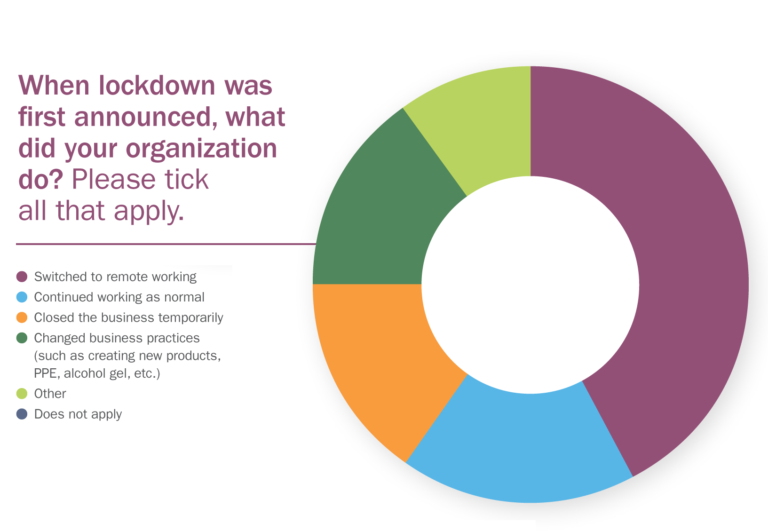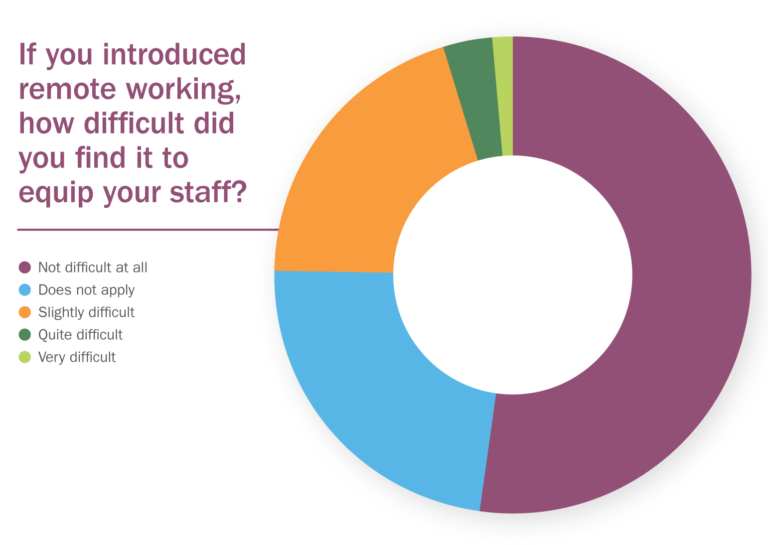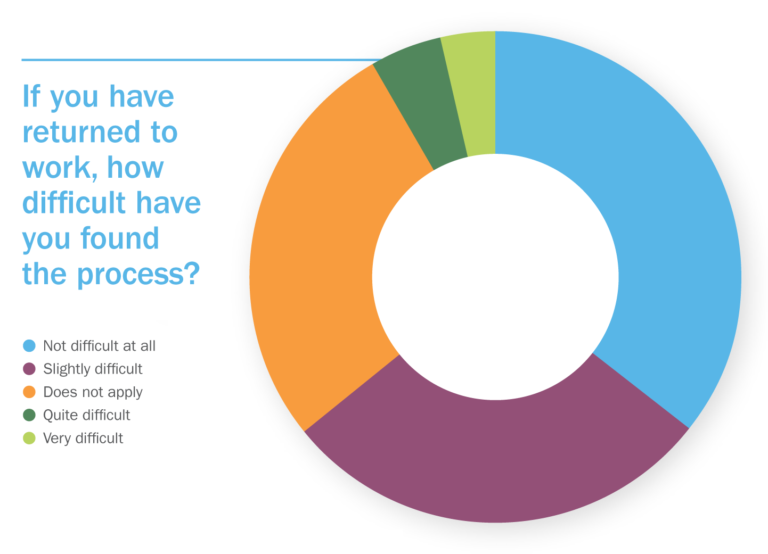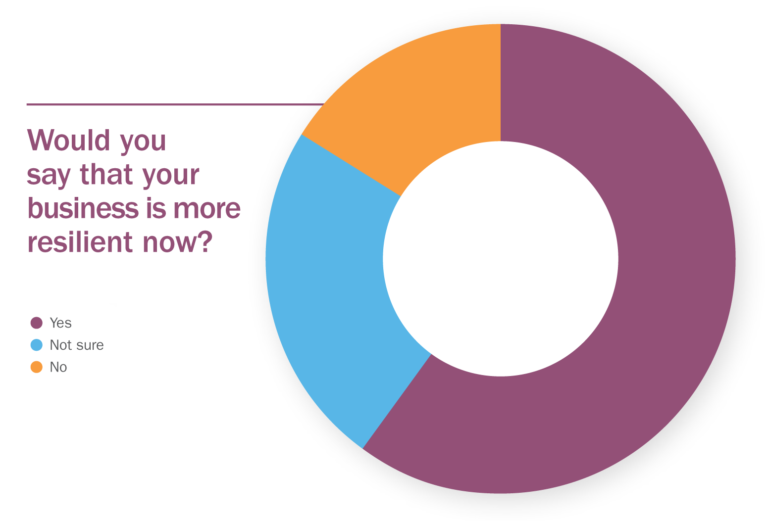Back to work report
Business resilience and recovery during and after the first lockdown
In spring 2020 the UK was thrust into an unprecedented national lockdown, which caused a huge seismic shift across the business world. But how did businesses cope with the situation? What did they do? And how did they recover as lockdown eased? To find out, we went and asked them.
Here is a summary of what we discovered.

2020 was dominated by the rapid spread of the Coronavirus Pandemic
As countries across the globe went into lockdown, words such as social distancing, furlough and second wave came to dominate our vocabulary and transform the business landscape.
As a result of the virus, many businesses were forced to close or to drastically transform their operations to slow the spread of coronavirus and protect their workers.
But while all businesses faced the same problem, the individual experience of the pandemic was not universal, with some businesses and business sectors able to adapt, respond and recover more effectively.
To find out more about what businesses experienced and what they did to cope, we set out to question them on how they reacted to the crisis and what their outlook is for the future.
The rise of remote working
Lockdown meant that ‘business as usual’ was only the case for a small minority of businesses. In our survey, just 17.4% of respondents were able to continue normal operations. A significant number (15.2%) were forced to close their doors, while the same percentage rushed to introduce PPE, alcohol gel stations or even new products.
But the vast majority of our respondents (42.4%) switched to remote working, with their office staff sent home with laptops and other devices to set up workstations. Despite having to do this at short notice and on a huge scale, our business respondents reported that they adapted well to this change. Indeed, 72.1% said that their business found the switch to be either ‘not difficult at all’ or merely ‘slightly difficult’. The setting up of new communication channels, such as video conferencing software, was also met with surprisingly little difficulty from just over half of our respondents, with 57.6% saying that it was not at all difficult to do.
“Since we were classed as key workers, we had to continue but we quickly put in place new working practices for our on-the-road engineers and office staff to ensure we were working as safely as possible.”

Staying cyber secure
The sudden rise of home workers and reliance on more virtual means of communication created an environment ripe for exploitation by cyber criminals.
Indeed, a report by cybersecurity company Darktrace to The Guardian revealed that the proportion of cyber attacks targeting home workers rose from 12% of malicious traffic before lockdown in March to more than 60% six weeks later.
However, it seemed our respondents were largely untroubled by cyber security fears with 54.1% saying that they did not find it at all difficult to maintain their cyber security during lockdown. Another 19.8% said that it was only slightly difficult.
This may be because some businesses were already well prepared for remote working and had the necessary equipment and software already set up.

Heading back to work
Going back to work didn’t mean that businesses went back to how they were before the lockdown in March.
Our respondents reported a wide range of measures that they implemented within their workplace in order to make them COVID-secure. This included introducing two-metre distancing (16.8%), equipping the business with alcohol gel (16.8%), providing PPE (13%) and implementing new cleaning rotas (12%).
Surprisingly, very few businesses seem to have taken additional training needs into consideration, with just 10.6% reporting that they trained their staff on handwashing, social distancing and symptoms of COVID-19.
Despite having to prepare and change their business in order to make it safe in the new pandemic world, our respondents were largely positive about their ability to go back to work safely. Indeed, 35.7% said that it wasn’t at all difficult to go back, while another 28.6% reported that it was only slightly difficult.

Business strength and resilience
What is perhaps most inspiring about the survey results is the positive view of businesses about their ability to adapt and cope with the changing situation.
Of our respondents, a significant 60.2% said that they came out of the lockdown feeling that their businesses were more resilient as a result. Another 30.7% said that their business had recovered very well, while 42% believed that they had recovered quite well.
Staff were also found to be highly adaptable, with 92% of our respondents saying that their workforces had adapted either very well or quite well.

Business recovery
“We saw a downturn in sales, which lasted for a significant period of two months. However, after the lifting of restrictions, sales started to return to pre-COVID levels.”
The bottom line of businesses was certainly disrupted by the effects of lockdown, reducing turnover, sales numbers and financial forecasts. However, it is remarkable that many businesses began to recover quickly following this disruption, resuming their production or services and returning to workloads that were similar to those before the crisis.

Support from ISOs and business continuity plans
Our survey revealed that businesses relied on carefully developed processes in order to keep critical operations going.
The robust processes of ISOs proved to be very important, with 63.1% of respondents who had an ISO reporting that they were useful in navigating lockdown.
Business continuity plans, which are designed to identify risks to the business and put in place useful plans to respond to and recover from business disruption, were also relied upon by 36.2% of participants. Some business plans had measures in place in case of pandemic, but others were able to adapt plans for remote working and other useful processes in order to support the transition during lockdown.
“Because we had these ISO systems in place, we have been able to manage the pandemic without too much disruption to the business.”
Looking to the future
Our survey of businesses and their experiences during lockdown and beyond shows a surprisingly positive picture, one in which many businesses were able to exit lockdown feeling that they had coped well with the crisis and were now better prepared for change going forward.
It is also positive how many businesses were able to smoothly adapt to remote working despite the speed of the change. This suggests that many modern businesses already had what it takes to create a more flexible workplace.
Going forward, the survey also highlighted the importance of training and of keeping an eye on cyber security, which is likely to continue to rise in importance as more and more workplaces undergo a digital revolution.
It also highlighted how having pre-made plans in place can lend vital support during a crisis.
If you would like to find out more about how ISOs could support your business operations, or how a business continuity plan could give your business confidence during disruption, you can take a look at our main ISO Standards page to see what may suit your business.


